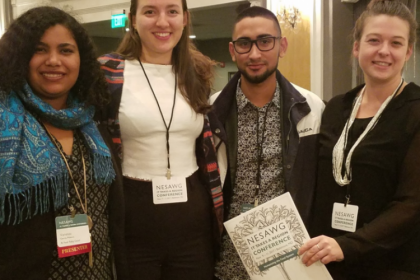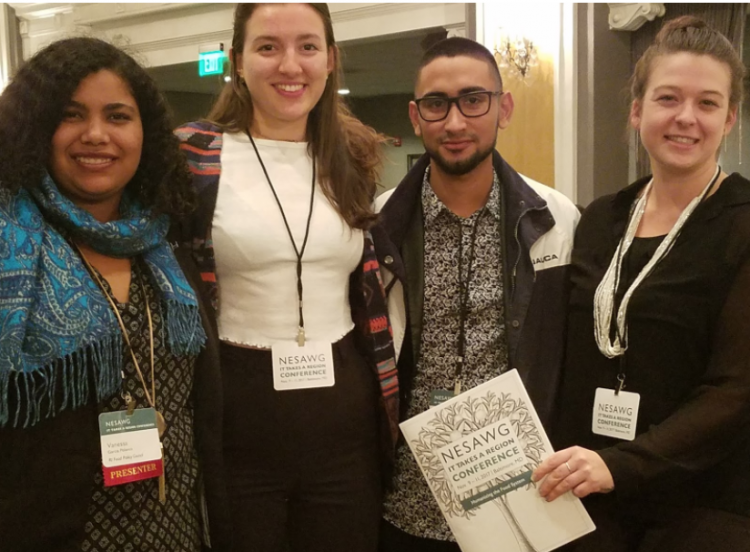
This post by Vanessa Garcia Polanco and Amirio Freeman originally appeared on NESAWG’s blog.
 Last fall, we attended the Northeast Sustainable Agriculture Working Group’s 2017 It Takes a Region Conference, thanks to generous scholarship support provided by NESAWG. Vanessa was selected as conference presenter and also as a youth delegate for NESAWG’s Youth Advocacy Day in Washington, DC, and Amirio attended the conference as general participant.
Last fall, we attended the Northeast Sustainable Agriculture Working Group’s 2017 It Takes a Region Conference, thanks to generous scholarship support provided by NESAWG. Vanessa was selected as conference presenter and also as a youth delegate for NESAWG’s Youth Advocacy Day in Washington, DC, and Amirio attended the conference as general participant.
At the conference and throughout the Youth Advocacy Day, emerging leaders, of diverse races and ethnicities, gender identities and expressions, geographic regions, and areas of expertise, were able to demonstrate the immense capacity younger people have to meaningfully contribute to creating a more just food system. We expanded food justice narratives by sharing our own experiences. We offered tools and resources for making the food justice movement more inclusive. And, probably most importantly, we had opportunities to interact with one another, exchange ideas, and learn across differences in experience and knowledge.
At the It Takes a Region Conference, we further exemplified the power of younger people by developing and presenting conference sessions. Vanessa created and led her own workshop entitled, “If You’re Not at the Table, You Are on the Menu: Young Minority Leaders as Stakeholders in Food and Agriculture,” to address the experiences of young intersectional leaders in food and agricultural spaces. During Vanessa’s workshop, we and other diverse participants under the age 30 had a conversation about the unique issues affecting us as members of the food justice movement and also about how we want to engage with and participate in food systems work. Unintentionally, the session became a refuge and safe space for sharing stories, good and otherwise, about our experiences at the NESAWG conference and in other related spaces.
We talked about everything. We shared our grievances regarding how we, as emerging leaders, are constantly deemed as less knowledgeable within the food systems spaces we belong to and serve–from food policy councils to farms to farmers markets to classrooms to digital spaces. We discussed how our experiences–as individuals just graduating high school or just entering college or navigating the 20s–are often underrepresented in food systems spaces, becoming overshadowed by the experiences of older people. An idea that was often referenced was how being a younger individual with an intersectional identity (that includes varied racial and ethnic, geographic, gender, etc. identities) can be a double-edged sword: individuals belonging to multiple communities can both offer valuable insights and perspectives and also experience tokenism or patronization. While we discussed the difficulties that come with being younger people engaging in food justice work, at NESAWG we participated in activities that confirmed and validated our expertise and experiences as food systems and food justice practitioners. Age is not a limiting factor when it comes to doing food systems works, reaffirming the need to infuse food systems thinking with new and innovative ideas for engaging all stakeholders, regardless of how old they are.
As a first step toward creating new and innovative ideas, we took all the feedback received at Vanessa’s session to develop a “Dos and Don’ts” list for food systems organizations looking to better create inclusive spaces for emerging leaders (which, ideally, should be every food systems organization!). Feedback is a gift to be given, and we wanted to create a resource that would be useful for not just NESAWG, but any and all food and agriculture spaces striving to build a more welcoming and just food system for everyone in the Northeast and beyond.
How to Engage with Emerging Leaders in Food Systems Spaces: Dos and Don’ts
Don’t call us “youth.” By labeling us as “youth,” you are denying us of our intersectionality as young immigrants, young refugees, young Latinxs, young African Americans, young non-binary individuals, and as young individuals from the other communities we represent. By labeling us as “youth,” you are perpetuating stereotypes such as “youth equals laziness” or “youth lack experience and knowledge.” The term “youth” diminishes our power and reinforces our infantilization.
Do call us “emerging leaders.” We are not just young: we are the communities and identities that have shaped us, and we bring those communities to our food systems work with experience and expertise.
Don’t consistently over-elevate the presence of youth. You are giving yourself a pat in the back when you do.
Do make it a norm to have us in the room, at the table, and at your conferences. Make our presence the norm, not the exception.
Don’t hand-hold us. Avoid patronizing us and giving us random tasks with no purpose.
Do give us responsibilities and specific tasks for us to develop our skills. Do acknowledge that our past personal or professional experiences and accomplishments are valid. Give us constructive feedback in our performance as mentors, not as supervisors.
Don’t perpetuate homogeneous spaces where we are tokens. Tokenization erases nuance, especially when it comes to having difficult conversations regarding power, privilege, and marginalization.
Do acknowledge systems of oppression. Discuss slavery, structural racism, sexism, misogyny and other intersecting systems of oppression as reasons to create more inclusive spaces.
Don’t use academic jargon or acronyms. Don’t assume we know what the context is. Being identified and separated because we are “youth” prevents us having access and exposure to certain resources, spaces, etc. that make it easier to learn certain jargon and terms that have become wisely used.
Do create a place where basic terms are used and communication is plain and accessible for all attendees. Make ground rules and/or contracts for us to have clear expectations, especially around language.
Don’t have a “youth track.” By having a “youth track” you reinforce the belief that the topics we are presenting are topics only youth could be possibly interested in. Having a “youth track” ghettoizes our experiences and expertise, helping to perpetuate the toxic elevation of specific voices and helping to further our collective disempowerment.
Do establish inclusive spaces. Create energetic, welcoming spaces where, as emerging leaders, we feel safe and comfortable to ask questions, interact, engage, and have roles that are equitable to those of our more mature counterparts.
Vanessa is a visionary and servant leader Dominican immigrant based in Rhode Island. She is passionate about immigrants, the environment, food systems and food culture. Follow more from her @vgpvisions.
Amirio is a Black, queer anti-hunger and anti-poverty advocate currently based in Washington, DC. You can follow their work at beinggreenwhileblack.club.
Photo provided by Vanessa. From left to right at NESAWG It takes a Region Conference: Vanessa Garcia Polanco, Elizabeth La Chapelle, David Landinez, Alexandra Neils frrom the University of Rhode Island




